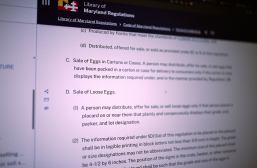White House wants info from state law enforcement on data practices

The White House Office of Science and Technology Policy is requesting state and local law enforcement agencies submit information on their current data practices for a report to President Joe Biden following an executive order aimed at increasing trust in policing and the criminal justice system.
The information request stems from an executive order Biden signed last May on accountability in law enforcement. The order established a working group on criminal justice statistics, and the group was tasked with developing a report on current data collection, use and data transparency practices with respect to state, local, tribal and territorial law enforcement activities.
These activities, according to the notice OSTP posted Feb. 16 to the Federal Register, include calls for service, searches, stops, frisks, seizures, arrests, complaints, law-enforcement agency demographics and civil asset forfeitures. It also includes the practices around managing datasets pertaining to use-of-force, officer-involved shootings, de-escalation incidents and hate- and bias-motivated crimes, among others.
The information is meant to assist the Biden administration’s understanding of current data collection, use and transparency practices across law enforcement activities.
“To improve outcomes for communities, we need to identify effective and emerging practices and opportunities to accelerate the adoption and adaptation of those practices across the nation’s approximately 18,000 State, Tribal, local, territorial (STLT) law enforcement agencies,” the notice read.
The Office of Science and Technology Policy did not request agencies to share data practices pertaining to surveillance technologies such as body-worn cameras, according to the notice. But it did ask law enforcement agencies and other entities in the criminal justice system to share how they collect, use and disaggregate public data. The office is also seeking to understand how agencies’ analyses of variables such as demographics and geography inform policy changes and affect equity.
The office also asked for recommendations on how to build the capacity of state and local law enforcement agencies to collect, use and create public datasets reflecting law enforcement activities.
Members of the public and law enforcement agencies have until March 30 to submit reports on their data collection, use and transparency practices.






